If you smash anchovies into softened butter with some grated garlic
you will live a fuller, richer life
Hello and welcome to Home Movies Tuesday! If you’ve found your way over by some miracle but are not yet subscribed, here, let me help you with that:
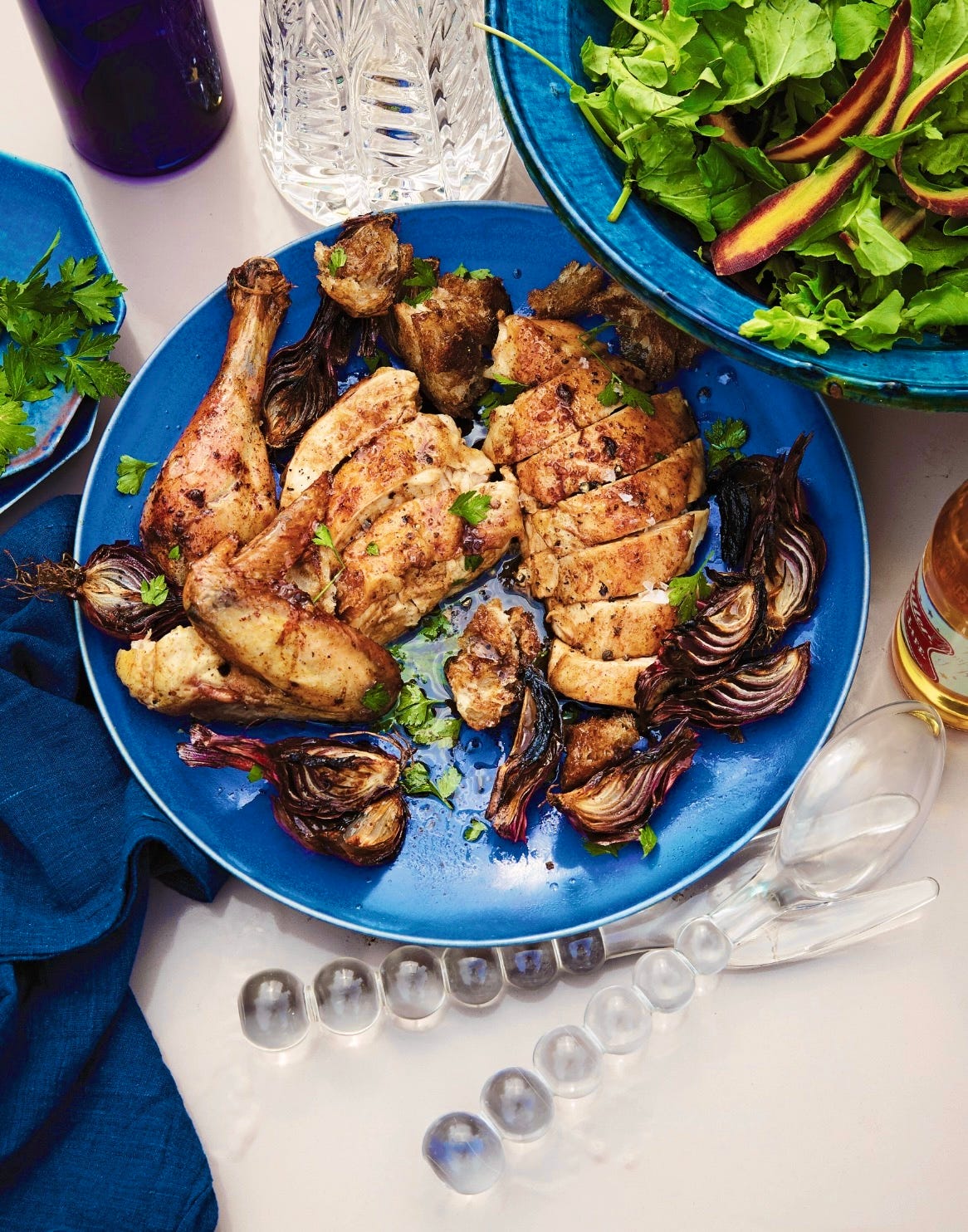
If you’re sick of hearing me talk about anchovies, 1. Thank you for sticking around long enough to hear me talk about anchovies so much 2. At least it’s not beans?
If you’re an anchovy acolyte (good t-shirt idea), then skip ahead. But if your experience with our tiny salty friends is limited to throwing a few filets into a skillet of olive oil with caramelized shallots and a can of tomato paste and okay, yes, just making shallot pasta, then read on. It’s my life's work to convince you that there are more reasons—possibly hundreds of reasons—to keep anchovies on hand. Number two, right behind shallot pasta, is anchovy butter. Specifically, to eat it with a spoon, or smeared onto a thick piece of radish, which is one of the world’s greatest pleasures. Doing this with a torn baguette on the side will immediately make you feel like you’re in Paris or maybe my home where I like to serve this often, even if just to myself.
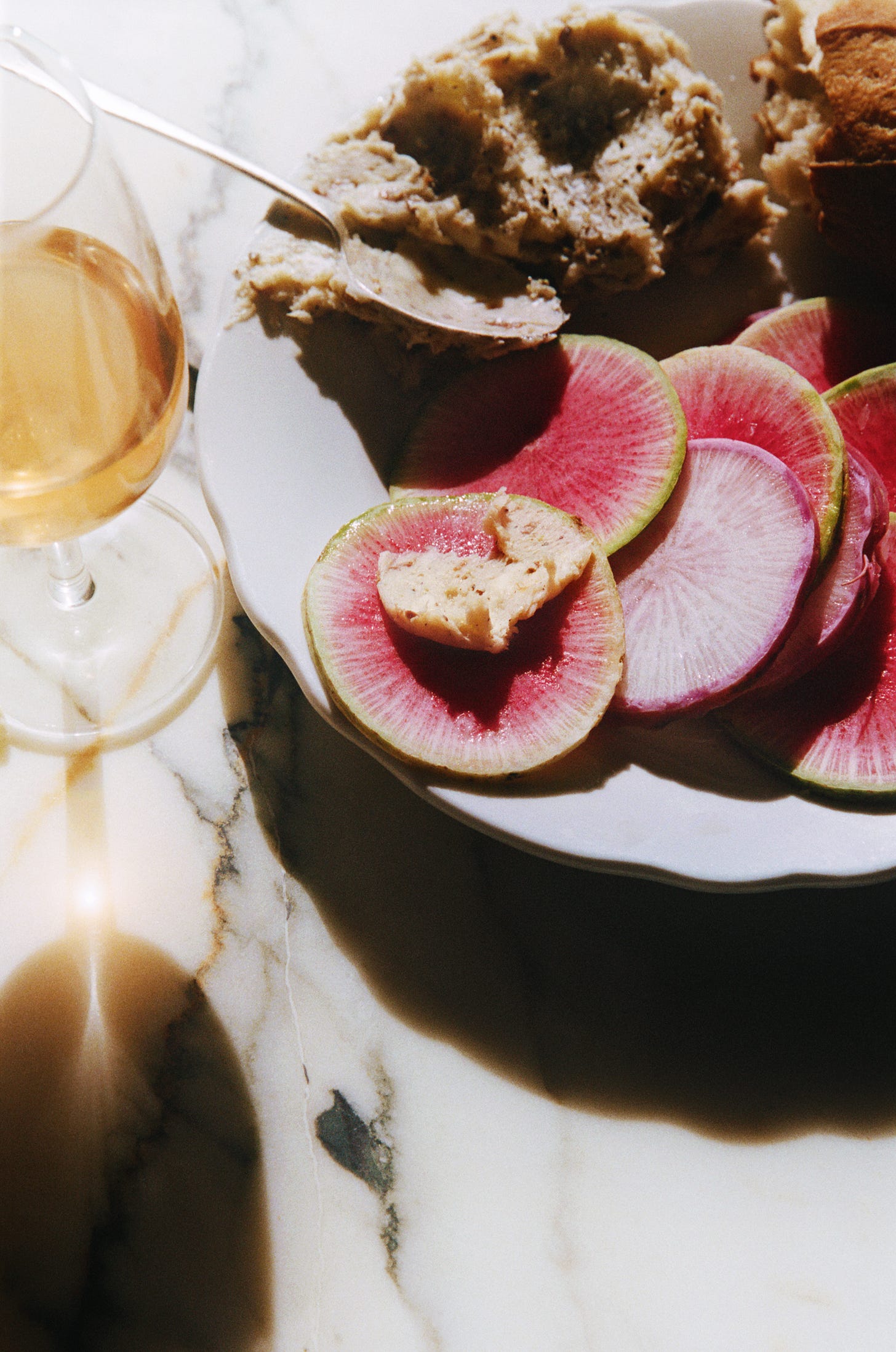
It’s equal parts garlicky and anchovy-y, but the fattiness of the butter really does tame both flavors, making them simultaneously more gentle and enjoyable, and that is the beauty of butter—what a gift. You can also do something else with that butter, like rub it onto a chicken and then roast that chicken. The chicken fat mingles with the anchovies and garlic which melt into butter, all becoming one indistinguishable juicy delight. If you haven’t done this, you should plan to do it immediately. Good news, there’s a video for that.
This week, I also get into the high/medium/low of anchovies (TLDR; Cento on the low, Cantabrian on the high, I like both), how to carve a chicken (slowly?) and the best salad to eat with both (there is mustard).
If you’re just here for the anchovy butter, I respect that. Double this recipe if you want. You will be happy you did.
Finely chop as many anchovies as you’re comfortable with (let’s call it 8–10, a whole tin’s worth) and add it to a stick (8 tablespoons) of room temperature butter, along with 2 cloves finely grated garlic (use a microplane for this if you have one). Season well with salt and pepper. Use a fork and smash everything together. That’s it! While the raw garlic isn’t for everyone, I promise you the butter really does mellow it out. And when you use it to roast a chicken or potatoes or baste a steak or whatever, it will completely soften, so don’t worry.
This will keep in your fridge for two weeks, probably longer. Bring to room temperature before using for greatest success with smearing and slathering.
For the full recipe, read on.
Director: Doron Max Hagay / Producer: Graham Mason / Photography Director: Eric Schleicher / Audio: Yves Albaret
Camera Operator: Alex Bliss / Camera Operator: Will Colacito / Editor: Maya Tippett / Graphics: Gordon Landenberger
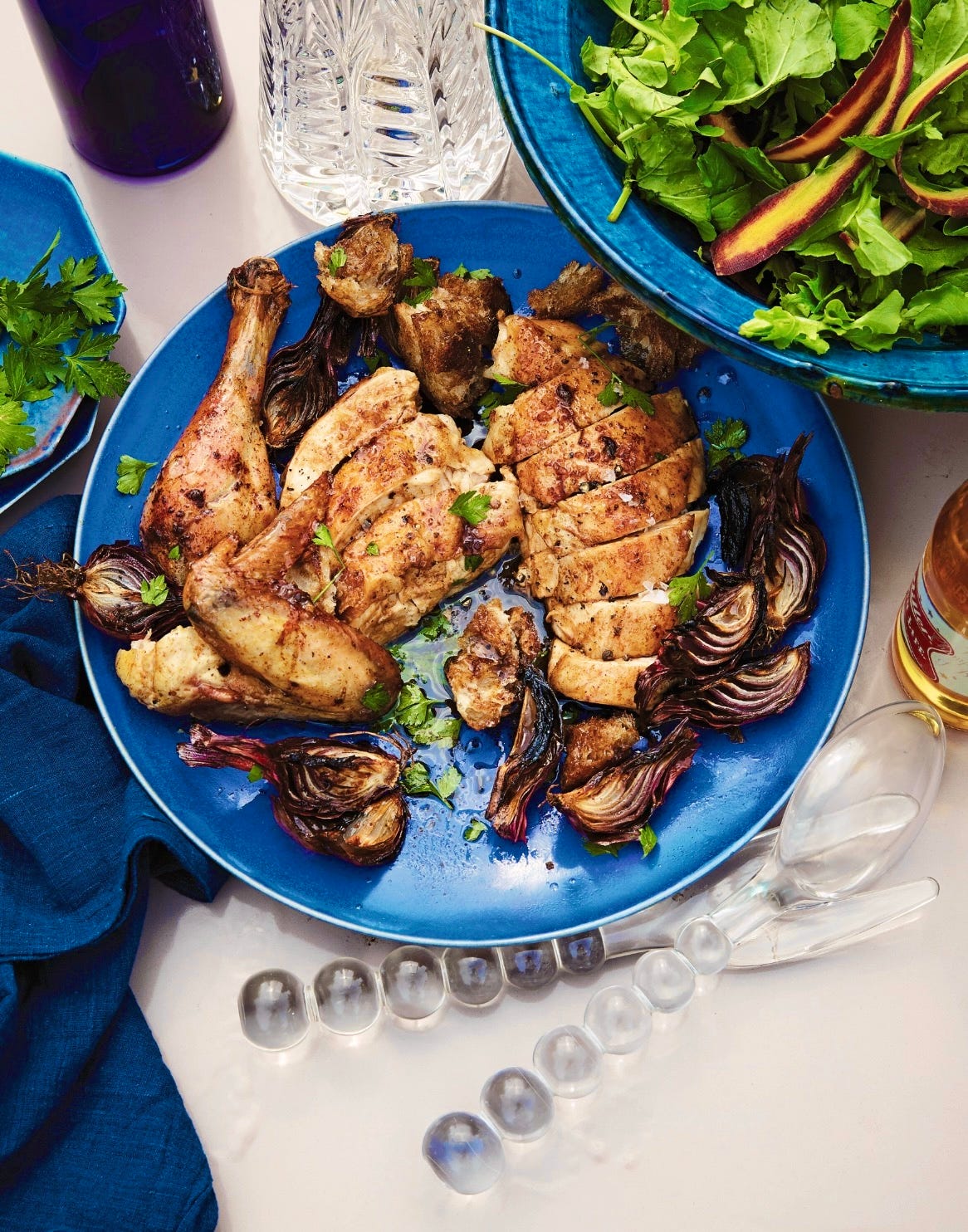
Anchovy-Butter Chicken with Chicken Fat Croutons
serves 4
When people ask me what my favorite thing to cook is, often I’ll give them the most boring but honest answer possible: roasted chicken. In a personal quest for “the one,” I’ve tried a bird every way possible—simple salt-and-pepper birds, spatchcocked and slow roasted, brined, and trussed—but I always come back to this version: smeared inside and out with a salty, garlicky anchovy butter; roasted at a high temperature for brown skin, then low for juicy breasts; stuffed only with more garlic and maybe some herbs; legs akimbo (truss if you want, but more often than not my policy is “no truss, no fuss”).
I’m going to be honest with you: this recipe is almost too much. The sticky juices from the roasted chicken, the caramelized bits from anchovy butter, and the croutons that cook in the skillet and crisp in the fat, well… I mean, it’s really all just too much. Almost. For what other dish would you be tempted to lick a hot skillet?
1 (3½ to 4 ½ lb) chicken
Kosher salt, freshly ground pepper
4 tablespoons unsalted butter, room temperature)
1 tin or jar anchovies in oil (about 10-12 anchovy filets), finely chopped
2 cloves of garlic, finely grated
1–2 heads of garlic, halved crosswise
½ bunch fresh thyme , marjoram, oregano and/or rosemary
1 lemon, halved crosswise
2 small red onions or large shallots, unpeeled and quartered
½ loaf of crusty bread, torn into 2-inch pieces
½ cup fresh parsley, tender leaves and stems, coarsely chopped
1. Preheat the oven to 425°F/218°C.
2. Season chicken with salt and lots of pepper and place on a rimmed baking sheet or in a cast iron skillet or whatever you want to roast it in; let it hang out while you make the anchovy butter.
3. Using a fork, smash the butter, anchovies, and grated garlic together in a small bowl and season with salt and pepper. Smear the chicken all over and inside every nook and cranny with this butter (like, really get in there). If you’re comfortable doing so, I encourage you to smear the butter under the skin, too.
4. Stuff the chicken cavity with the halved garlic, lemon and herbs. Scatter the onions around the chicken, season with salt and pepper, and roast until the bird starts to brown, 40 to 45 minutes. Toss the onions around to coat them in whatever amazing fat has dripped off the chicken, then reduce temperature to 325°F and continue to roast until the chicken is cooked through and the onions are gloriously golden, another 30 to 35 minutes.
5. Transfer the chicken to a cutting board or large serving platter, leaving the juices and onions behind (if you prefer your onions on the softer, jammier side, pull the onions out at this step too). Increase the oven temperature back to 425°F (ugh, I know, annoying—just do it, though) and toss the bread in all the glorious fat and cooking juices on the baking sheet, making sure the pieces are soaking up all the business left behind. Return the baking sheet to the oven to crisp up the bread, 10 to 15 minutes. Serve this alongside the chicken, with the roasted onions and parsley scattered around and on top.
Any-Greens Mustard Dressing
makes about 1/2 cup
I don’t really make vinaigrettes, but I do occasionally make dressings, especially when making salad for large groups of people. This distinction is that a vinaigrette is emulsified with olive oil or occasionally diluted with water. A dressing is cutting to the chase, just the acid and alliums combined to evenly coat each leaf in your bowl. This one is pretty basic, but very good, with lots of whole grain mustard– the spicier the better for me– but Dijon works, too (just expect a creamier texture). As for the greens, peppery arugula, crisp romaine, and ruffly kale are all great contenders, but my hands-down favorite is escarole. It’s somehow both delicate and strong, able to hold up to dressing and retain its oomph where a weaker leaf may wilt (sorry to the weaker leaves).
To use this in a salad, dress your leaves first with this dressing, tasting for salt, pepper and more vinegar if you think it needs it (probably won’t), then a nice drizzle of olive oil to finish.
2 tablespoons whole grain mustard
¼ cup sherry, white wine, or red wine vinegar
Kosher salt and cracked black pepper
¼ cup thinly sliced chives or scallions
1. Combine mustard and vinegar in a small bowl. Add chives and season with salt and pepper.
I’m wearing this Herringbone chain necklace in this week’s episode of Home Movies.
These Rizzoli anchovies are my favorite middle-of-the-pack anchovies to stock. They’re great to cook with and good enough to snack on.
I use this Le Creuset Braiser for everything, including roasting a chicken. It’s wide and shallow enough that everything can sit in one layer without overcrowding.
AND, if that’s not enough excitement for one day, a reminder I’m going on tour (very soon !). Now’s your chance to ask me any questions IN-PERSON, what a thrill.
Find me in Denver, Seattle, Portland OR, Vancouver, San Francisco, Atlanta, Philadelphia and Brooklyn this May for the first and only tour of the year. Xx














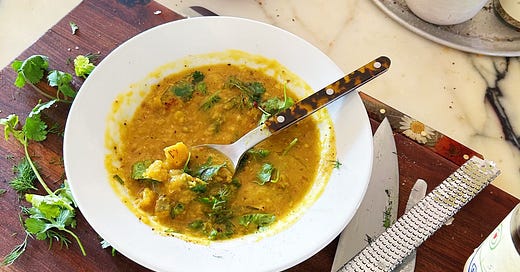



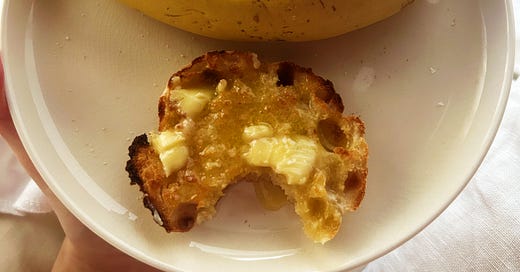


This is the best roast chicken I have ever made. So delicious my "vegetarian" husband requests it frequently.
Loved this recipe. The new kitchen and video style is beautiful.